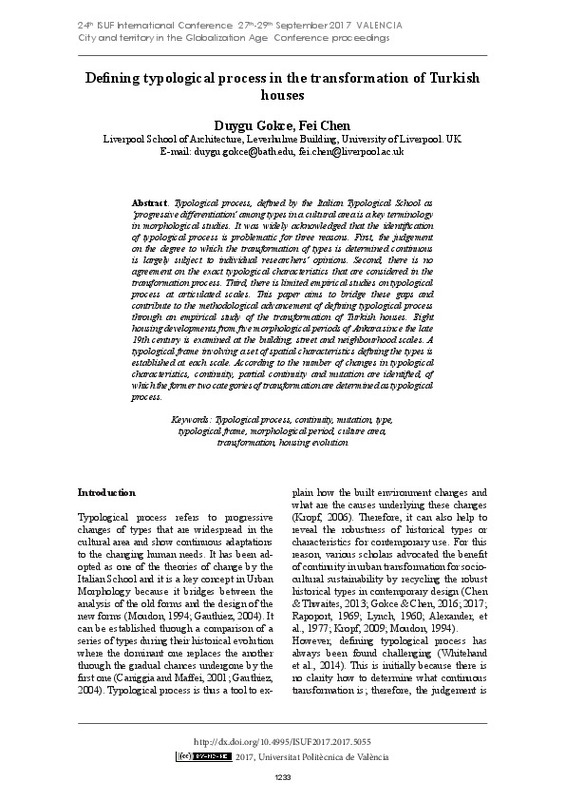JavaScript is disabled for your browser. Some features of this site may not work without it.
Buscar en RiuNet
Listar
Mi cuenta
Estadísticas
Ayuda RiuNet
Admin. UPV
Defining typological process in the transformation of Turkish houses
Mostrar el registro sencillo del ítem
Ficheros en el ítem
| dc.contributor.author | Gokce, Duygu
|
es_ES |
| dc.contributor.author | Chen, Fei
|
es_ES |
| dc.coverage.spatial | east=35.243322000000035; north=38.963745; name= Turquia | es_ES |
| dc.date.accessioned | 2018-12-20T13:17:07Z | |
| dc.date.available | 2018-12-20T13:17:07Z | |
| dc.date.issued | 2018-04-20 | |
| dc.identifier.isbn | 9788490485743 | |
| dc.identifier.uri | http://hdl.handle.net/10251/114290 | |
| dc.description.abstract | [EN] Typological process, theorised by the Italian Typological School as a continuous transformation process of types, has been frequently discussed in the field of urban morphology. It was widely acknowledged in the field that the identification of typological process can be problematic for three reasons. First, the judgement on the degree to which the transformation of types is determined continuous is largely subject to individual researchers’ opinions. Second, there is no agreement on the exact typological characteristics that are considered in the transformation process. Third, there is limited empirical studies on typological process at articulated scales. This paper attempts to shed some light on the definition of typological process in a rigorous manner through an empirical study of the transformation of Turkish houses. The research compares eight selected housing developments from five morphological periods of distinctive socio-economic, political and cultural conditions in Ankara since the late 19th century. First, a typological frame involving a set of spatial characteristics defining the types is established at the building, street and neighbourhood scales. Then, these spatial characteristics are compared in a chronological order. According to the number of typological characteristics showing continuous, partial continuous or mutational changes, typological process at the three scales are identified. This paper demonstrates a methodological advancement on the definition of typological process in relation to the aforementioned problems. It reduces the ambiguity in the definition of house types in Turkey and can be applicable to other contexts. | es_ES |
| dc.format.extent | 12 | es_ES |
| dc.language | Inglés | es_ES |
| dc.publisher | Editorial Universitat Politècnica de València | es_ES |
| dc.relation.ispartof | 24th ISUF International Conference. Book of Papers | es_ES |
| dc.rights | Reconocimiento - No comercial - Sin obra derivada (by-nc-nd) | es_ES |
| dc.subject | Typological process | es_ES |
| dc.subject | Continuity | es_ES |
| dc.subject | Mutation | es_ES |
| dc.subject | Type | es_ES |
| dc.subject | Typological frame | es_ES |
| dc.subject | Morphological period | es_ES |
| dc.subject | Culture area | es_ES |
| dc.subject | Transformation | es_ES |
| dc.subject | Housing evolution | es_ES |
| dc.title | Defining typological process in the transformation of Turkish houses | es_ES |
| dc.type | Capítulo de libro | es_ES |
| dc.type | Comunicación en congreso | es_ES |
| dc.identifier.doi | 10.4995/ISUF2017.2017.5055 | |
| dc.rights.accessRights | Abierto | es_ES |
| dc.description.bibliographicCitation | Gokce, D.; Chen, F. (2018). Defining typological process in the transformation of Turkish houses. En 24th ISUF International Conference. Book of Papers. Editorial Universitat Politècnica de València. 1233-1244. https://doi.org/10.4995/ISUF2017.2017.5055 | es_ES |
| dc.description.accrualMethod | OCS | es_ES |
| dc.relation.conferencename | 24th ISUF 2017 - City and Territory in the Globalization Age | es_ES |
| dc.relation.conferencedate | Septiembre 27-29,2017 | es_ES |
| dc.relation.conferenceplace | Valencia, Spain | es_ES |
| dc.relation.publisherversion | http://ocs.editorial.upv.es/index.php/ISUF/ISUF2017/paper/view/5055 | es_ES |
| dc.description.upvformatpinicio | 1233 | es_ES |
| dc.description.upvformatpfin | 1244 | es_ES |
| dc.type.version | info:eu-repo/semantics/publishedVersion | es_ES |
| dc.relation.pasarela | OCS\5055 | es_ES |








